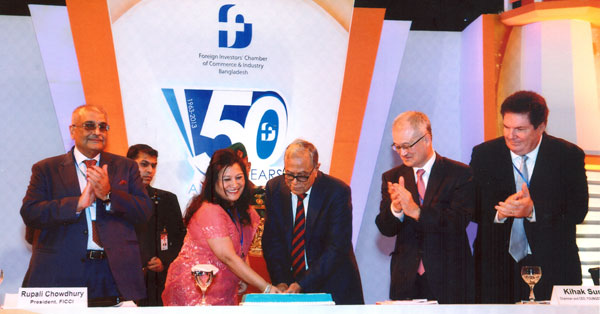while addressing the 50th anniversary of the Foreign Investors’ Chamber of Commerce and Industry (FICCI) on Monday, 18 August 2014.

Published in The Financial Express
FICCI calls for political stability, good governance
FE Report
The Foreign Investors’ Chamber of Commerce and Industry (FICCI) felt the need for political stability, good governance and reduction of corruption, energy security and infrastructure development to take Bangladesh on a higher scale of economic advances.
With this call to government authorities the trade body of foreign investors celebrated the 50th founding anniversary of the FICCI Saturday, with President Abdul Hamid attending their function at Hotel Sonargaon as chief guest.
“To take Bangladesh to the next level of socioeconomic development we need robust improvements in all aspects — economic, governance and human development,” said FICCI president Rupali Chowdhury welcoming all to the golden-jubilee celebration.
President Abdul Hamid inaugurated the programme by cutting an anniversary cake and appreciated the role of FICCI in promoting trade and business as well as attracting foreign direct investment (FDI) to the country.
He urged the foreign investors and the entrepreneurs to choose Bangladesh as their first investment destination, saying that a very congenial atmosphere for investment is prevailing in the country.
“The government is providing various incentives for foreign investment and ensuring 100 per cent security to the foreign investors in Bangladesh,” said the President, urging them to contribute more to enlivening the country’s economy.
The President thanked the FICCI members for their contributions, especially in the post-liberation period, for the development of the country’s economy. Since its inception in 1963, the FICCI has been playing an important role in attracting foreign investment, he said.
Besides representatives of FICCI member-companies, business leaders, senior government officials, members of the diplomatic corps and media representatives attended the function.
The function was also addressed, among others, by Youngone Group Chairman Kihak Sung, Centre for Policy Dialogue (CPD) Distinguished Fellow Debapriya Bhattacharya and Standard Chartered Bank’s CEO Jim McCabe.
Dwelling on the inflow and importance of FDI, Debapriya pointed out that Bangladesh was lagging behind regional competitors and that the flow of FDI into Bangladesh is one of the lowest.
In terms of per-capita inflow, performance is lower (USD 6.5) compared to neighbouring India (USD20.3) and Myanmar (USD 46).
According to Debapriya, about 74 per cent of FDI has originated from top 10 countries. Recently inflows from Egypt, Singapore, Hong Kong and UEA increased significantly.
FDI inflows have shifted from manufacturing to service sector over the last 13 years. The sector-wise FDI flow fell in power, gas and petroleum. However, telecoms, textiles and wearing, banking and food sector attracted more foreign investment.
In contrast to inflows, outflow of FDI is also increasing consistently, driven by repatriation of oil, gas and power companies’ earnings, said Debapriya in his paper presented at the function.
He, however, did not elaborate.
The President also pointed out that Bangladesh received the highest-ever $1.73 billion in foreign direct investment in the fiscal 2012-13.
He stressed the need for more foreign investment for the country’s overall development through tapping the potential. There are enormous opportunities for investment in power generation, energy exploration, infrastructure development, shipbuilding, textile, leather industry, ICT and agro-industry, he noted.
“Foreign investors can invest in these lucrative sectors,” he said, urging FICCI members to extend their cooperation.
Kihak Sung, chairman of the Youngone Group, which brought the country’s first FDI in apparel sector, highlighted the urgency for increasing efficiency of Chittagong Port and improvement of Dhaka-Chittagong Highway to attract more FDI.
“The development of infrastructure and, at the same time, protection of environment is now a global challenge which Bangladesh can address appropriately,” he told the business gathering.
Highlighting the country’s RMG industry he said the sector contributes immensely to the economy. “All of us are very proud of ‘Made in Bangladesh’ garments.”
But, he noted, still there are rooms to grow further if some burning issues could be addressed. He indicated an acute crisis of power and energy.



